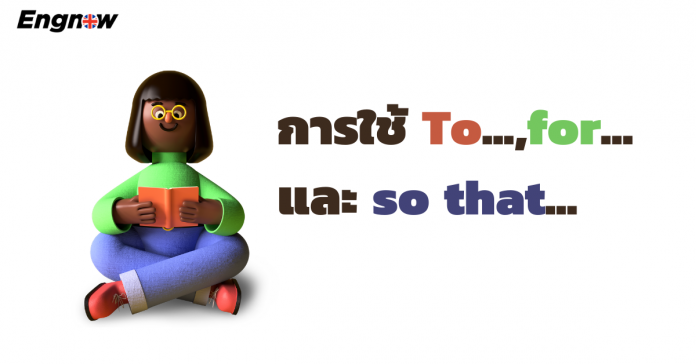มาลองดูตัวอย่างเหล่านี้กัน
- I phoned the restaurant to reserve a table.
- What do you need to make bread?
- We shouted to warn everybody of the danger.
- This letter is to confirm the decisions we made at our meeting last week.
- The president has a team of bodyguards to protect him.
จากตัวอย่างด้านบน เราใช้ to เพื่อบอกถึงจุดประสงค์ที่เราทำว่าทำเพื่ออะไรอย่างเช่น to reserve = เพื่อจอง, to make = เพื่อทำ คือเราจะใช้เพื่อให้รู้ถึงจุดประสงค์ของประโยคนั้นๆว่าเพื่ออะไร
.
.
เราสามารถพูดได้ว่า “a place to park”, “something to eat”, “’work to do” อย่างเช่น
- It’s difficult to find a place to park in the centre. (= a place where you can park)
- Would you like something to eat? (= something that you can eat)
- Do you have much work to do? (=work that you must do)
- I get lonely if there is nobody to talk to.
- I need something to open this bottle with.
.
.
นอกจากนั้นเรายังใช้ money/time/chance/opportunity/energy/courage (etc.) to do something เพื่อทำอะไรบางอย่าง อย่างเช่น
- They gave us money to buy food.
- Do you have much opportunity to practise your English?
- I need a few days to think about your proposal.
.
.
.
ทีนี้เราลองมาเปรียบเทียบตัว for … และ to … กัน
| For + Noun | To + Verb |
| We stopped for petrol. | We stopped to get petrol. |
| I had to run for the bus. | I had to run to catch the bus. |
เราสามารถพูดได้ว่า “for somebody to do something”
เช่น
- There weren’t any chairs for us to sit on, so we sat on the floor.
(ไม่มีเก้าอี้ให้เรานั่ง เราเลยต้องนั่งบนพื้น)
.
.
เรายังสามารถใช้ for -ing or to … เพื่อพูดถึงจุดประสงค์ทั่วไปของบางสิ่งบางอย่าง อย่างเช่น
- I use this brush for washing the dishes. หรือ … to wash the dishes.
.
.
แต่เราจะไม่ใช้ for -ing เพื่อบอกว่าทำไมใครบางคนถึงทำบางสิ่งบางอย่าง อย่างเช่น
- I went into the kitchen to wash the dishes. (ไม่ใช่ for washing)
.
.
นอกจากนั้นเรายังสามารถใช้ What … for? เพื่อถามเกี่ยวกับวัตถุประสงค์ของบางสิ่งบางอย่าง อย่างเช่น
- What is this switch for?
- What did you do that for?
.
.
.
So that
เราจะใช้ so that (not to … ) โดยเฉพาะ
- เมื่อวัตถุประสงค์เป็นด้านลบ (so that .. . won’t/wouldn’t):
- I hurried so that I wouldn’t be late. (= เพราะฉันไม่อยากสายจริงๆ)
- Eat something now so that you won’t (or don’t) get hungry later.
.
.
- ใช้กับ can หรือ could (so that .. . can/could):
- She’ll learn English so that she can study in Canada.
- We moved to London so that we could see our friends more often.
.
.
- เรายังสามารถตัด that ออกได้ อย่างเช่น
- I hurried so that I wouldn’t be late. หรือ I hurried so I would not be late.












